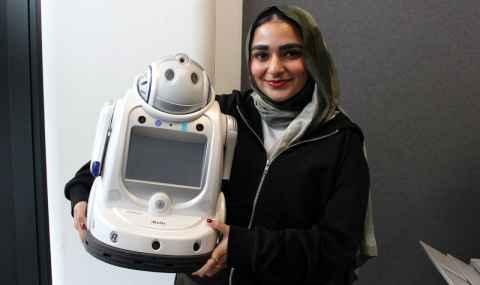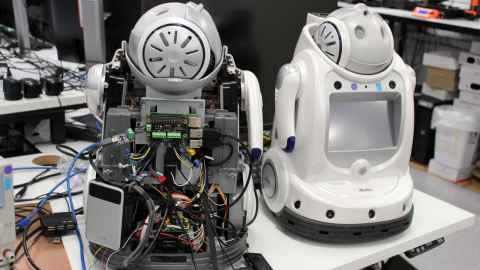Wanted: Older people for new research
15 August 2025
People aged 60 and over are needed for research involving a robot designed to boost their memory and intellectual skills.

University of Auckland Master of Robotics and Automation Engineering student Zahra Ally is looking for participants for her research with a robot called iRobi.
“This is a tiny robot, about 50cm tall, that can dance and move around – it’s very cute.
“It can talk and make sounds and has been especially designed for older people and children,” says Ally, who is supported by the University’s Centre for Co-created Ageing Research.
The 24-year-old hopes to bring her study to people in Auckland who are suffering from mild cognitive decline or dementia.
Having worked as a software designer at Rocket Lab, Ally is developing a new game for iRobi to offer.
“The game will assess people with cognitive decline or early symptoms of dementia.
“Hopefully it will help older people stay mentally sharp for longer,” she says.

The research launching next month will involve up to three sessions of about 30 minutes with 30 older people in their own homes or care facilities.
Ally will use their feedback about iRobi to co-create a tool that meets their needs.
“Co-creation is about partnership and giving older people dignity and a voice.
“Their feedback is valuable, because when you’re designing technology forolder people, it’s a different ballgame.
“We need to make sure they want to use the technology and they’re comfortable using it.”
Ally plans to complete the research project in December, but is keen to further her studies with a PhD.
“This could include a longitudinal study to test if iRobi and the cognitive games minimise symptoms of cognitive decline or dementia.”
First-hand experience with a grandfather who suffered from Alzheimer’s disease inspired Ally to pursue her research path.
“Having witnessed someone with Alzheimer’s for many years, I realised how important it is to try to help people with dementia. It was a very sad thing to see,” she says.
Although robots are becoming increasingly advanced, Ally says they won’t be taking over the roles of human caregivers anytime soon.
“This is a support tool and not a replacement for caregivers.
“Hopefully, it will help the older people’s overall wellbeing and help the people who are taking care of them too.”
Anyone interested in participating in the study can contact Zahra Ally at zall683@aucklanduni.ac.nz.
Media contact
Rose Davis | Research communications adviser
M: 027 568 2715
E: rose.davis@auckland.ac.nz